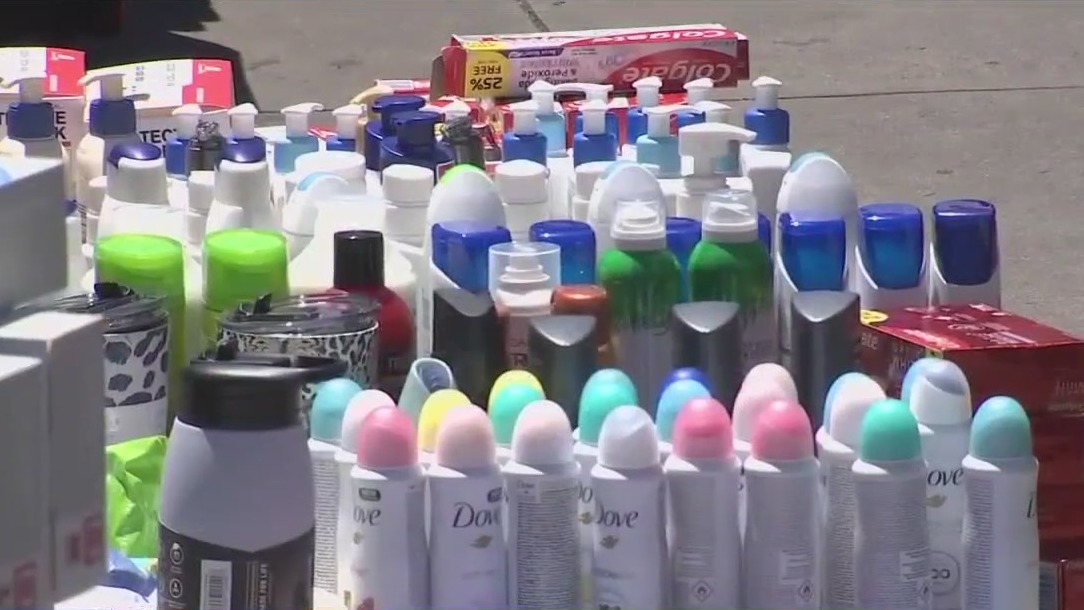San Francisco opens spaces for vendors to sell while street vending ban in place

San Francisco opens up space for vendors to sell indoors
San Francisco has established temporary marketplaces in the Mission District for vendors to sell their goods indoors, coinciding with the newly implemented street vending ban.
SAN FRANCISCO - A 90-day ban on street vending in San Francisco's Mission District kicked into effect on Monday.
Under the ban, vendors can't sell good of any kind on the sidewalk.
The city enacted the ban after San Francisco Supervisor Hilary Ronen highlighted issues with sidewalks being blocked and overcrowded, leading to problems with trash and crime.
Ronen said illegal fencing operations had moved onto Mission Street alongside longtime vendors, creating a dangerous situation.
"There's been violence on the streets in the neighborhood" said Ronen. "One vendor was killed, and the accused is another vendor. There was extortion, many of these vendors here, the legitimate vendors, had been extorted."
The city has established two designated spots for vendors to sell their goods in a controlled environment. Vendors must go through an application and approval process before they can sell at the city-sanctioned sites.

90-day street vendor ban in effect in San Francisco's Mission
A 90-day ban on street vendors in San Francisco's Mission District went into effect Monday because city officials claim there are too many creating a nuisance. Officials cited blocked sidewalks, trash and safety as reasons why the ban was put in place.
An old furniture store on 17th and Mission streets is one of the locations. The other one is at 24th and Capp streets.
CLECHA, a nonprofit organization that supports small businesses, is managing the new indoor market at 17th and Mission streets. A temporary sign was placed above the door, reading, "El Tiangue," which is the Spanish word for "bazaar" or "open-air market."
Alma Castellanos, operations manager for CLECHA, said there is a range of emotions among the 43 vendors approved to set up shop in El Tiangue today.
"There is a lot of excitement," she said, but also concern. "Their concern is not enough foot traffic, a lot of them [street vendors] were at the Bart plaza previously. They're not sure their customers will find them here. So we're doing a lot to get the word out, announcing this shop on social media. We want to get people out to come do their holiday shopping here and support these vendors."
Ana Celia Martinez was among the vendors who moved into El Tiangue. She said she likes the idea of being inside a designated location.
Martinez, who sells toys, keychains, and jewelry, said she doesn't have to worry about working in the rain or bad weather.
She also said it's safer than where she used to sell her items, on the sidewalk at 16th and Mission streets.
Some residents were pleased that the ban went into effect.
"They should have done this a long time ago," said resident Lorenzo Reyes-Soto.
However, Cesar Oyagat, who has sold on Mission Street for more than two decades, believes that the ban going into effect during the holiday shopping season will create a significant hardship for him and other vendors.
"This is one of our busiest months, and they know that we buy our merchandise specifically for this month. But, yet the city has not moved to change the start date," he said.
Ana Valle owns the Abanico Coffee Roasters coffee shop on 17th and Mission streets. She sympathized with legitimate vendors who sold hand-made crafts, but said the streets had become "chaos" with people laying down blankets on the sidewalk with drug store items like toilet paper and shaving cream, "posing" as legitimate vendors.
"With all the congestion on the sidewalks, it wasn't a pretty street," she said. "All the small businesses up and down Mission, we don't have the foot traffic. People were afraid to come here."
She said the city of San Francisco is partly to blame for letting the situation get worse over the past two years and for being too lax about issuing permits to vendors.
"All it took was just $9 and a name," Valle said. "They were just giving out sidewalk space for $9? There's no way to vet for anything."
She and others hope the 90-day ban will change things.
It's not clear what will happen after the 90-day ban is up.
But not everyone is happy about it.
The Mission Street Vendors Association said there is not enough space at the two city-sanctioned sites for all the street vendors to make a living.

